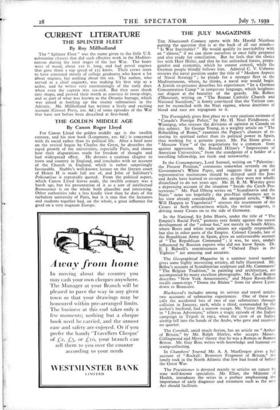THE JULY MAGAZINES
THE Nineteenth Century opens with Mr. Harold Nicolson putting the question that is at the back of all our minds- " Is War Inevitable? " He would qualify its inevitability with an " almost," if we can show ourselves at once fully prepared and also ready for conciliation. But he feels that the choice lies with Herr Hitler, and that he has unleashed forces, propa- gandist and economic, which he cannot control, while the German people blindly follows him. Admiral C. V. Usborne reviews the naval position under the title of " Modern Aspects of Naval Strategy " ; he pleads for a stronger fleet in the Mediterranean, where, he thinks, a naval war would begin. A Jewish ex-prisoner describes his experiences " In a German Concentration Camp " in temperate language, which heightens our disgust at the brutality of the guards. Mr. Robert d'Harcourt, writing on " The Roman Catholic Church and National Socialism," is firmly convinced that the Vatican can- not be reconciled with the Nazi regime, whose doctrines of blood and race are repugnant to it.
The Fortnightly gives first place to a very cautious estimate of " Canada's Foreign Policy," by Mr. H. Noel Fieldhouse, of Winnipeg, who stresses the divisions of opinion in Canada on this subject. Sir George Young, in a weighty article on " The Rebuilding of Rome," examines the Papacy's chances of re- storing its spiritual rather than its political power in Spain, thus working for a genuine peace. Mr. Pat Sloan gives a "Moscow View" of the negotiations for a common front against aggression. Mr. Ronald Hilton's " Impressions of American Universities," from the standpoint of a holder of a travelling fellowship, are fresh and noteworthy.
In the Contemporary, Lord Samuel, writing on " Palestine : the Present Position," comments somewhat severely on the Government's White Paper, and suggests that a grant of representative institutions should be delayed until the Jews and Arabs have learned to co-operate, as they were not wholly disinclined to do ten years ago. Mr. H. R. M. Worsley gives a depressing account of the situation " Inside the Czech Pro- tectorate." Mr. Paul Olberg writes on " Scandinavia and the Nazis " none too hopefully; pro-Nazi influences are in his view already considerabe. An unsigned article, " What Will Happen to Yugoslavia? " stresses the resentment of the Croats at Serb arbitrariness which, the writer suggests, is driving many Croats on to the side of Germany.
In the National, Sir John Harris, under the title of " The Empire's Racial Peril," protests very firmly against the recent development of the " colour bar," not merely in South Africa, where Boers and white trade unions are equally responsible, but also in other parts of the Empire. Colonel Casado, late of the Republican Army in Spain, gives an unfavourable account of " The Republican Command "' it was, he says, unduly influenced by Russian experts who did not know Spain. Dr. E. J. Bidwell's reminiscences of " Oxford Days in the 'Eighties " are amusing and accurate.
The Geographical Magazine in a summer travel number gives some highly interesting articles, all fully illustrated. Mr. Belloc's account of Scandinavian sculpture and Mr. Cammaerts' " The Belgian Tradition," in painting and architecture, are accompanied by many excellent photographs. Mr. Cecil Beaton describes "New York Amusements," and Major Raven-Hart recalls canoe-trips " Down the Rhone " from far above Lyons down to Beaucaire.
Blackwood's includes among its service and travel articles two accounts of submarine experiences. One of these re- calls the accidental loss of two of our submarines through collision in January, 1918, while a third, commanded by the author's husband, had a narrow escape. Mr. Victor MacClure, in " Libyan Adventure," relates a tragic episode of the Italian campaign in Tripoli in 1912, when the crew of an Italian airship fell into the hands of the Arabs, who gave and received no quarter.
The Cornhill, amid much fiction, has an article on " Arthur of Britain," by Mr. Ralph Shirley, who accepts Messrs. Collingwood and Myres' theory that he was a Roman or Roman Briton. Mr. Guy Boas writes with knowledge and humour on stamp-collecting.
In Chambers' journal Mr. A. A. MacGregor gives a full account of " Rockall: Remotest Fragment of Britain," the lonely rock in the North Atlantic that few had heard of before the Great War.
The Practitioner is devoted mainly to articles on cancer by nine well-known specialists. Mr. Elliot, the Minister of Health, introduces the series in a preface emphasising the importance of early diagnosis and treatment such as the new Act should facilitate.










































 Previous page
Previous page